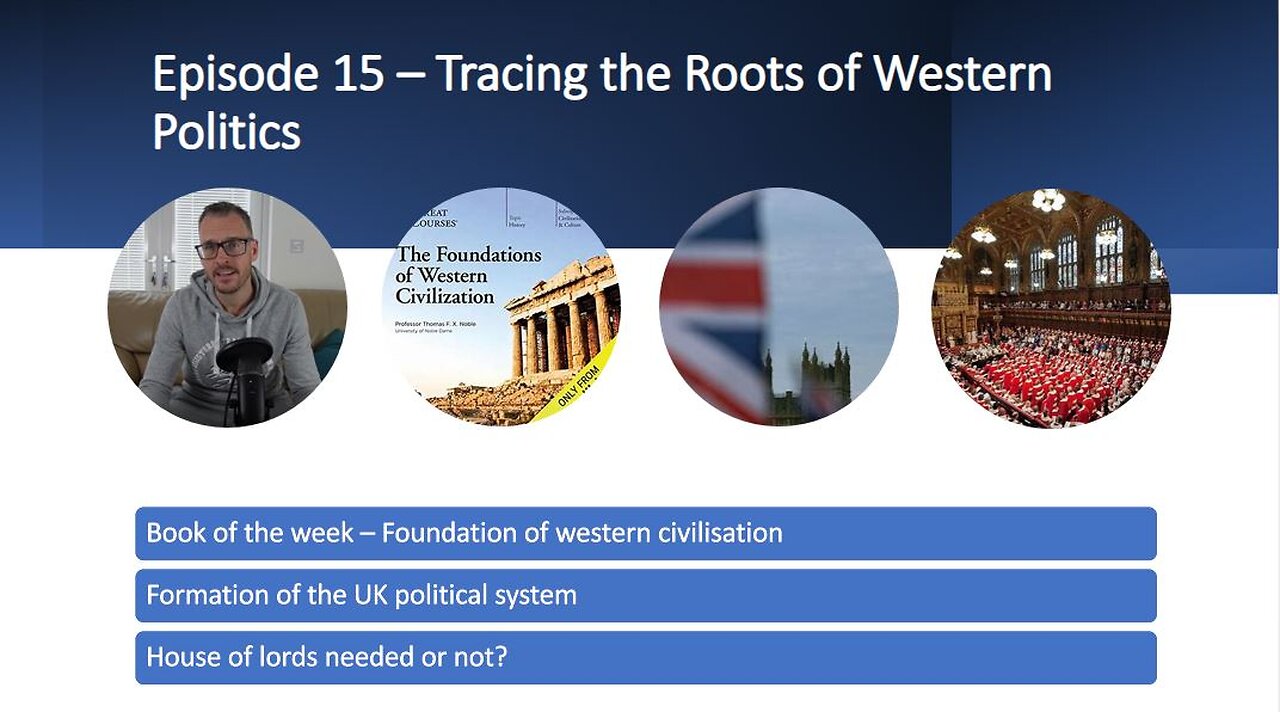Premium Only Content

Episode 15 Tracing the roots of western politics
The UK currently operates as a parliamentary democracy, which means that the people elect members of Parliament to represent them and make decisions on their behalf. The UK government is headed by the Prime Minister, who is appointed by the monarch and is usually the leader of the party that has the most seats in Parliament. The Prime Minister is responsible for appointing other ministers, who are responsible for running government departments and implementing policy.
The UK government is divided into three branches: the executive, the legislative, and the judiciary. The executive branch is responsible for implementing policy and is headed by the Prime Minister and Cabinet. The legislative branch is responsible for making laws and is made up of the House of Commons and the House of Lords. The judiciary branch is responsible for interpreting and enforcing the law and is made up of the courts and the judges who preside over them.
The UK government operates within a hierarchical structure, with the Prime Minister at the top, followed by the Cabinet and then the various government departments. The civil service, which is made up of government employees who are responsible for implementing policy, operates within this hierarchical structure.
The UK is also a constitutional monarchy, which means that while the monarch holds a symbolic role as the head of state, they do not hold any real political power. Instead, the monarch's role is primarily ceremonial, and they act as a representative of the UK both domestically and internationally.
The House of Commons and the House of Lords are the two chambers of the UK's parliament, which is responsible for making laws and holding the government to account.
The House of Commons is made up of 650 elected Members of Parliament (MPs) who are elected by the people of the UK in general elections that are held every five years. The number of MPs representing each political party is determined by the number of votes they receive in the election, with the party that wins the most seats forming the government.
The House of Lords, on the other hand, is not elected. Instead, its members are appointed by the monarch on the advice of the Prime Minister. The House of Lords is made up of approximately 800 members, including life peers (people who are appointed for life), hereditary peers (people who inherit their titles), and bishops of the Church of England.
The House of Commons has more power than the House of Lords, as it is directly elected by the people and is responsible for initiating most legislation. However, the House of Lords still has an important role to play in the legislative process, as it can propose amendments to bills passed by the House of Commons and can delay or block their passage into law.
Overall, the UK's political system is complex, with multiple layers of government and a hierarchical structure. While the UK has evolved over time, the principles of parliamentary democracy and constitutional monarchy remain at the core of its political system.
In "The Foundations of Western Civilization," Professor Thomas F. Noble provides an engaging and informative overview of the key events and ideas that shaped the development of Western civilization from its earliest beginnings to the present day. Drawing on a wealth of historical research and analysis, Noble presents a vivid picture of the people, cultures, and ideas that have contributed to the unique character and achievements of the West.
One of the most interesting aspects of the book is Noble's emphasis on the diversity and complexity of Western civilization. Rather than presenting a simplistic, linear narrative of progress, Noble highlights the many different cultures, traditions, and intellectual movements that have contributed to Western civilization over time. From the ancient Greeks and Romans to the Christian church and the Enlightenment, Noble shows how the West has been shaped by a rich tapestry of ideas and influences.
Another compelling aspect of the book is Noble's exploration of the ways in which Western civilization has been shaped by conflict and struggle. Whether it is the wars between the ancient city-states of Greece, the struggles between the Church and secular authorities in the Middle Ages, or the ideological conflicts of the modern era, Noble shows how conflict and struggle have been essential to the development of Western civilization.
Overall, "The Foundations of Western Civilization" is an excellent introduction to the history of the West. It is well-written, accessible, and engaging, and it provides a wealth of information and insights into the key events, ideas, and people that have shaped the Western world. Whether you are a student of history or simply interested in learning more about the world around you, this book is well worth reading.
-
 LIVE
LIVE
Right Side Broadcasting Network
10 days agoLIVE REPLAY: President Donald J. Trump Keynotes TPUSA’s AmFest 2024 Conference - 12/22/24
5,302 watching -
 4:31
4:31
CoachTY
23 hours ago $27.59 earnedCOINBASE AND DESCI !!!!
130K11 -
 10:02
10:02
MichaelBisping
22 hours agoBISPING: "Was FURY ROBBED?!" | Oleksandr Usyk vs Tyson Fury 2 INSTANT REACTION
67K13 -
 8:08
8:08
Guns & Gadgets 2nd Amendment News
2 days ago16 States Join Forces To Sue Firearm Manufacturers Out of Business - 1st Target = GLOCK
97.5K86 -
 10:17
10:17
Dermatologist Dr. Dustin Portela
2 days ago $18.00 earnedOlay Cleansing Melts: Dermatologist's Honest Review
137K14 -
 1:02:20
1:02:20
Trumpet Daily
2 days ago $42.82 earnedObama’s Fake World Comes Crashing Down - Trumpet Daily | Dec. 20, 2024
94.9K61 -
 6:29
6:29
BIG NEM
1 day agoCultivating God Mode: Ancient Taoist NoFap Practices
70.1K20 -
 30:53
30:53
Uncommon Sense In Current Times
2 days ago $11.03 earned"Pardon or Peril? How Biden’s Clemency Actions Could Backfire"
86.6K7 -
 40:01
40:01
CarlCrusher
1 day agoSkinwalker Encounters in the Haunted Canyons of Magic Mesa - ep 4
77.1K10 -
 59:44
59:44
PMG
2 days ago $10.65 earned"BETRAYAL - Johnson's New Spending Bill EXPANDS COVID Plandemic Powers"
80.3K49